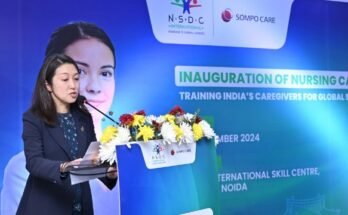Union Minister of Skill Development and Entrepreneurship, Rajiv Pratap Rudy launched the transnational skill standards in New Delhi with the aim to support two major initiatives of the Government i.e. Make in India” and Skill India” and to align to skill standards which are recognized globally, in the presence of British High Commissioner India Sir Dominic Asquith KCMG, Secretary, Ministry of Skill Development and Entrepreneurship, Shri Rohit Nandan along with several stakeholder.
“Standardization of vocational education is crucial in bringing about a level in the efficiency of the skilled workforce”, said Shri Rudy. He said, it is governments endeavor to benchmark the standards so as to support international mobility of Indian workforce and also prepare them to work in international companies having their operations in the country. He said, his Ministry has chosen UK standards to benchmark Indian Skills standards since all the Gulf Cooperation Council (GCC) countries recognize UK skill certification.
The launch also witnessed signing of Memorandum of Understandings (MoUs) between National Skill Development Council (NSDC) and Association of Colleges (UK) and NSDC and UK Awarding Organization City & Guilds and Pearsons Education that will enable sharing of best practice, staff exchange, and development of new models to increase employer engagement and investment in skills. UK awarding organization City & Guilds and Pearson will certify the trainees on the gap in association with Indian SSCs.
British High Commissioner to India Sir Dominic Asquith KCMG said “India and UK have been collaborating on skill development since a long time now and this is yet another effort to bring more quality in vocational education which will open more avenues for employment across countries for the youth.”
Under these standards in skill development, 15 Indian Sector Skill Councils (SSCs) have benchmarked standards of 82 job Roles with the standards of 11 UK SSCs after representatives of the sector skill councils of both the nations worked together over a span of 3 months from January 2016.
The Transnational Standards will highlight the gaps in Indian Standards against the UK standards. To cover the gaps, those intending to migrate, will undergo bridge training. The Further Education Colleges (FE) of the United Kingdom will partner with Indian Training Providers to impart training on bridge courses. FE Colleges to set up Skill Academies of Excellence in the identified sectors in India.
The key highlight of this partnership is recognition of the Indian SSC Assessment and Certification by the UK Awarding bodies. Those interested to migrate will simply have to take bridge training” on the gap identified in the bench-marking process and get assessed on the components of the bridge training”. Thus just by doing bridge training” and getting assessed and certified on it, will lead to award of UK IVQ which has a global acceptance including Gulf Cooperation Council (GCC) countries.
The Indian Sector Skill Councils which participated in the project are: Automotive, Agriculture, Life Science, Healthcare, Capital Goods, Apparel, Textiles, Beauty and Wellness, Telecom, Hospitality, IT & ITeS, Consturction, Retail, Electronic and Security.
Indian SSCs were mapped to following UK SSCs who participated LANTRA (Agriculture), IMI (Automotive), Habia (Beauty and Wellness), SEMTA (Capital Goods), Summit Skills (Construction and Electronics), People 1st (Retail and Tourism & Hospitality), Skills for Security (Security), Creative Skill Set (Apparel and Textiles), Tech Partnership (IT and Telecom), Cogent (Life Sciences) and Skills for Health (Healthcare).
A couple of Employers from Gulf Cooperation Council (GCC) countries who committed employment to Indian workforce certified on these benchmarked standards were also present at the function.
Note: News shared for public awareness with reference to the information provided at leading e-news portals.



